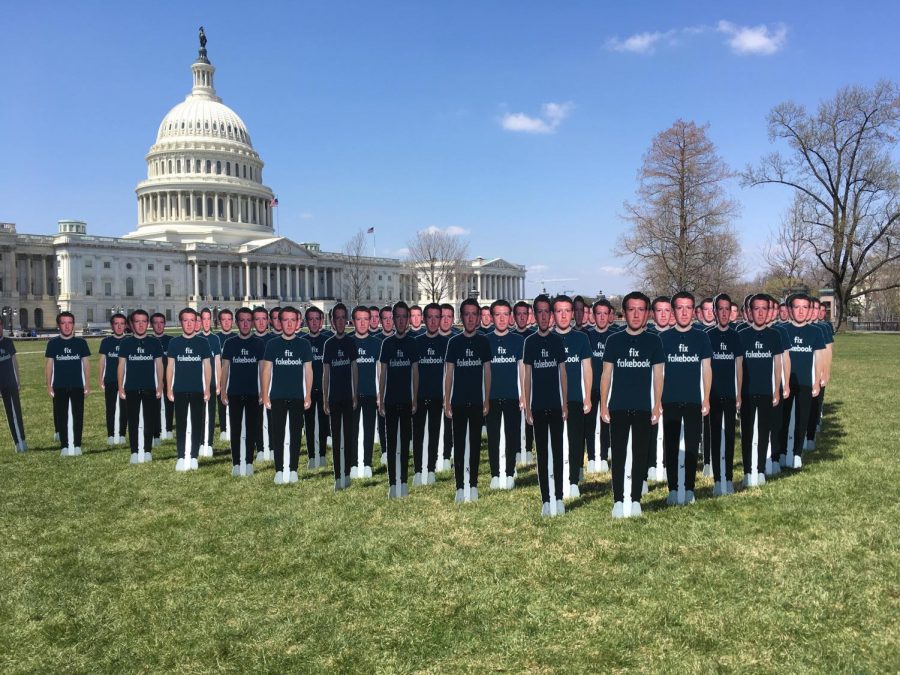Dissenting opinion: No likes for Zuckerberg’s testimony
LIfe-sized cutouts of Facebook CEO Mark Zuckerberg in the Capitol Lawn hours before he appeared before the Senate Judiciary Committee
April 17, 2018
The privacy invasion scandal involving Cambridge Analytica, a London-based data firm, and Facebook showed both companies inappropriately handled the personal information of about 87 million people. Amid this rancor, Sen. Richard Blumenthal (D-Conn.) was one of many senators who pushed for a congressional hearing and “immediate action” by lawmakers.
When Facebook CEO Mark Zuckerberg appeared before the Senate Judiciary Committee and the House Energy and Commerce Committee on April 10 and 11, Facebook users expected the tech geek to give lawmakers answers to tough questions about how Cambridge Analytica acquired personal data. Rather, it was another “how to use Facebook” lecture. Zuckerberg didn’t commit to any reform, didn’t list any regulations he is willing to support and got a pass to dodge the tough questions. This doesn’t set any precedence for future privacy violations.
GIF alert: “Senator, we run ads.”
When Sen. Orrin Hatch (R-UT) pressed Zuckerberg about the possibility of Facebook changing its business model, Hatch didn’t understand how Facebook generates revenue–by offering a free site propped up by targeted ads.
“If a version of Facebook will always be free, how do you sustain a business model in which users don’t pay for your service?” asked the 84-year-old Senator.
Texas Sen. Ted Cruz used the hearing to grill Zuckerberg about what he sees as a pervasive pattern of bias and political censorship.
“Does Facebook consider itself as a neutral public forum?” asked Cruz.
“There’s certain content that we don’t allow, hate speech, terrorist content, nudity and anything that makes people feel unsafe,” said Zuckerberg in response to Cruz’ question.
Although Cruz had a legitimate case given Facebook’s recent exchanges with Diamond and Silk, two social media personalities who support conservative causes, he diverted our attention from Facebook’s data breach.
And this was the trend throughout the hearings.
There were some notable moments during Zuckerberg’s testimony. Illinois Sen. Dick Durbin must be commended for putting a spotlight on Facebook and privacy. This was the reason why Zuckerberg left the technology hub of the United States for Washington D.C.
“Would you be comfortable sharing with us the name of the hotel you stayed in last night?” Durbin asked Zuckerberg.
“Um, no,” Zuckerberg said in response to Durbin’s question.
This is the crux of the problem. Facebook users have a right to privacy, and that right was violated. As Durbin puts it: “The limits of your right to privacy and how much you give away in modern America in the name of connecting people around the world.”
Nevertheless, Facebook must be commended for taking swift action since data was compromised by Cambridge Analytica. The company has made privacy tools easier to find, restricted Facebook Login data, created political and issue ads for authorized users and launched a Data Abuse Bounty program to reward people who report any misuse of data by app developers.


















